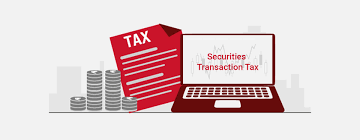Securities Transaction Tax (STT) is a direct tax levied on the trading of securities in India. Introduced in 2004, STT aims to curb speculative trading and generate revenue from the financial markets. It is imposed on the transaction value of securities traded on recognized stock exchanges, including shares, derivatives, and equity-oriented mutual funds.
An example of STT is during an equity delivery transaction. You buy 100 shares from company ABC at Rs. 500 per share. It is a delivery-based equity transaction. The STT rate for this transaction is 0.1% on both the buy and sell sides.

What is Securities Transaction Tax or STT?
Securities transaction tax is a type of tax levied on gains from securities. This includes mainly equities and futures and options. The rate of taxation is different for different types of securities. STT can basically be understood as a type of tax levied on transactions done in the domestic stock exchange. Securities transaction tax is a direct tax and is levied and collected by the central government of India.
The most prominent point about securities transaction tax is that STT charge is applicable only on share transactions made through a recognized stock exchange in the country. Off-market share transactions are not covered under STT.
Features of Securities Transaction Tax
STT is a simple direct tax and is not very complicated to calculate or levy. Some of the most distinguishing features of STT are as listed below.
- STT charge is levied on all sell transactions for both options as well as futures
- For purpose of STT calculation, each future trade is valued at the actual traded price while each option trade is valued at premium
- The amount STT that a clearing member has to pay is the sum total of all the STT taxes of trading members under him
Securities Liable for STT
- Shares, bonds, stocks, scrips, debentures, or other marketable securities of an incorporated company or a body corporate
- Units or instruments in any other form issued by any collective investment scheme for its investors
- Derivatives, for example, options and futures
- Equity-oriented mutual funds units
- Any securitised debt instruments
- Rights or interest in securities
Understanding How is STT Levied
Taxable Securities Transaction | STT Rate | Person Responsible for Paying STT | Value on Which STT is Levied |
Delivery-based purchase of equity share | 0.1% | Purchaser | Price at which equity shares are purchased |
Delivery-based sale of equity share | 0.1% | Seller | Price at which equity is sold |
Sale of units of mutual funds | 0.001% | Seller | The selling price of the mutual fund units |
Sale of equity share or a unit of an equity-oriented mutual fund when such contract is settled otherwise by actual delivery of unit or share | 0.025% | Seller | Value of securities based on the volume-weighted average price |
Sale of options in securities | 0.1% | Seller | Value of options premium |
Sale of options in securities where options are exercised | 0.125% | Purchaser | The settlement price of a contract |
Sale of futures in securities | 0.02% | Seller | The trading price of futures |
Sale of a unit of an equity-oriented fund to the Mutual Fund – ETFs | 0.001% | Seller | Price at which unit is sold |
Sale of unlisted shares under an offer for sale to the public included in IPO and where such shares are subsequently listed in stock exchanges | 0.2% | Seller | Price at which such shares are sold* |
Purchase of Units of Equity Oriented Mutual Funds | NIL | Purchaser | NA |
FAQs
When is Securities Transaction Tax Levied?
Securities transaction tax is levied on each purchase and sale of equity listed on a domestic and recognized stock market. The rate of taxation is determined by the government. All stock market transactions that involve equity or equity derivatives like futures and options are liable to be taxed under the STT act. STT is charged as soon as a share transaction is completed. This makes STT fast, transparent and effective. Since the tax is levied as soon as the transaction arises, instances of non-payment, wrong payment etc. are reduced to minimum. The net result of this however, is that it pushes up the cost of the transactions.
Securities on which STT is Applicable?
- Shares, bonds, debentures or any such marketable security which is traded at the stock market
- Derivatives traded in the market
- Units issued by any collective investment scheme to customers
- Government securities that are of the nature of equity
- Rights or interests in securities
- Mutual funds that are based on equity trading